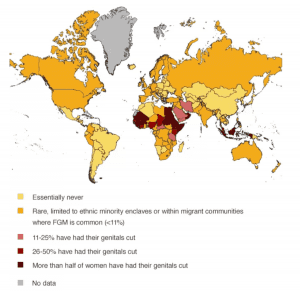The group, known as End Female Genital Cutting Singapore, is a community-led movement founded in 2020 by local Muslim-raised women and activists, who are making their rounds distributing brochures advocating against the practice of female genital mutilation (FGM) in Singapore.
Singapore, despite being one of the most developed countries in the world, still has more than three-quarters of the Muslim women who have undergone FGM, as found in a pilot study conducted in October 2020. What is FGM, and why are people rising against the practice? This article will bring you all you need to know.
What is it?
Female genital mutilation (FGM), also known as female genital cutting or female circumcision, is a harmful traditional practice that involves the partial or total removal of the female external genitalia for non-medical reasons. It is typically performed on girls between infancy and age 15. In many cases, the procedure is carried out by traditional practitioners who do not have any medical training.
There are four different types of FGM, ranging from partial or total removal of the clitoris to the removal of the labia minora and/or majora. In some cases, the vaginal opening is narrowed or sealed, leaving only a small opening for urine and menstrual blood. In many parts of the world, the procedure is usually performed without anaesthesia and often in unsanitary conditions.
WHO has made it very clear that FGM is a violation of the basic human rights of girls and women. It does not provide any health benefits, but only bodily and mental harm.
Where is it prevalent?
According to the latest WHO data, more than 200 million girls and women alive today have undergone the procedure, mostly in 30 countries in Africa, the Middle East and Asia.

Figure 1 Prevalence of FGM as of 2015
Many of the communities who practice FGM are Islamic in religion, but the practice also exists within some Christian and animist groups. In Singapore, the practice only exists in its Malay Muslim communities, making up 13% of the country’s residents. Every year, more than 3 million girls are estimated to be at risk of being forced to have this procedure.
Why is it performed?
FGM is often performed in communities where it is considered a cultural or religious tradition. However, there are no religious texts (neither in Islam nor Christianity) that require FGM, and the practice is in no way medically beneficial. In many cases, FGM is performed to control women’s sexuality and ensure their virginity before the marriage. It is also seen as a way to preserve a girl’s purity, reduce their libido, and reduce the chance of having extramarital affairs. However, none of the above can justify the horrific violation of basic human rights and misogynistic views.
What are the health risks?
- Pain: The procedure of FGM is usually performed without anaesthesia in many parts of the world and can cause severe pain during and after the procedure.
- Bleeding: FGM can cause excessive bleeding, which can lead to haemorrhagic shock and even death in some cases.
- Infection and sepsis: The procedure of FGM is often carried out in unsanitary conditions, which can lead to infections. When germs spread in human blood, it might eventually cause sepsis – a multi-organ failure that will ultimately result in death.
- Urinary and menstrual problems: FGM can cause difficulties with urination and menstrual problems, such as painful periods, and can increase the risk of infections during menstruation.
- Sexual problems: FGM can cause pain during sexual intercourse, reduced sexual desire, and difficulty with sexual arousal.
- Pregnancy and childbirth complications: FGM can increase the risk of complications during pregnancy and childbirth, including prolonged labour, difficult delivery, and even death of the mother or child.
- Psychological problems: FGM can cause long-term psychological trauma, including depression, anxiety, and post-traumatic stress disorder.
Other than the health risks, such practice also symbolizes and normalizes the suppression of women in society.
Conclusion
In Singapore, the Islamic Religious Council of Singapore has affirmed that “any form of procedure which has been medically proven to bring harm, including female genital mutilation or FGM, should be avoided”. The practice is also illegal in most countries in the world. However, as you read through this article, dozens of girls in the world are forced to undergo this inhumane procedure, most of them without knowing why. WHO estimated that treatment of the health complications of FGM cost health systems US$ 1.4 billion per year, a number expected to rise unless urgent action is taken towards its abandonment. Although international pressure and public health education are necessary, ultimately it is up to you and me to stand up against such practices and make our voices heard.

